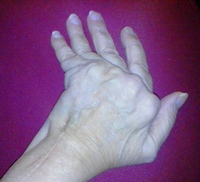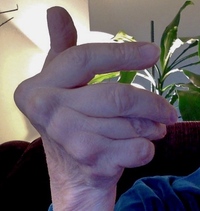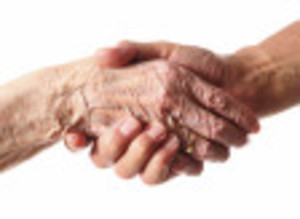Republican Presidential candidate Donald Trump's November, 2015 mocking imitation of journalist Serge Kovaleski, who suffers from a congenital joint condition, was met with world-wide shock, disdain, and outrage.
Teasing or mimicking of disabilities is rude; it is a major social no-no, as is staring or pointing. Most of us are taught early in life, at an age when we are also taught the danger of running with scissors, that people, come in all sizes and colors. Today there is a great deal of emphasis on going beyond tolerance to acceptance in our language and in our actions toward differences between and among people.
What was called teasing when I went to school in the 1950's is now defined as bullying and our awareness has been heightened to the serious ill-effects such behavior can have on the recipients of taunting, including suicide, when the bullying is intense and involves exposure on the internet.
But there are unintended slights we need to be aware as well.
People have many disfiguring or deforming conditions. A TV ad for medication to treat Psoriatic Arthritis features the phrase "See me, don't stare at me."
I have RA (Rheumatoid Arthritis).
RA is very different from OA (osteoarthritis) which is the wear-and-tear disease that comes to many as they age. RA, however, is a chronic, incurable, autoimmune disease that causes swollen, tender, and painful joints and can lead to deformities of all joints affected with resulting disabilities. RA is systemic, which means it can also affect all body organs not just joints. It can cause inflammation of the heart and the lungs, can affect the eyes, cause vasculitis and symptoms such as fatigue. It affects women three times more than men and most commonly begins between ages 30 and 60. (When children get it is called juvenile arthritis.)
Many with RA who begin early treatment with current biologic agents (tumor necrosis factor inhibitors such as Enbrel, Kineret, Humira and Orencia), DMRADS (Disease-modifying antirheumatic drugs), or methotrexate (alone or in combination) often find relief, even remission. For others, symptoms, including fatigue, can come and go.
For many such RA patients, their biggest social problem is having an "invisible" ailment and the lack of understanding they receive when they are having a bad day.
Not so for me. I have had RA for approximately 40 years. I was diagnosed decades before the new drugs, which stop the progression of the disease, and thus eliminate a great deal of the permanent crippling, were available. Also, the prevailing thinking for RA treatment at the time was conservative, i.e. start with the mildest of NSAIDs (non-steroidal anti-inflammatory drugs) in the class with aspirin and ibuprofen. Today, treatment is generally more aggressive and far better, so that those newly diagnosed will likely never experience the deformities I have. Even among those who have had the disease as long as I have, my case is rather severe and unusual.
Recently, I mentioned to an acquaintance my self-consciousness about my hands and that I try to keep them out of sight. I was asked:
"Why don't you wear gloves?"
I explained that: #1) I cannot get any gloves on my gnarly, twisted hands and in the winter I have to wear MITTENS, and #2) didn't she think that would only draw MORE attention to my hands?
I am sure she meant well, despite the fact that we were having this conversation on a sweltering hot day in the midst of a summer heatwave, and even if we were in the middle of a winter cold wave, wouldn't wearing gloves indoors be extremely conspicuous?
I imagine in her mind it was a helpful suggestion like asking a woman who said she was self-conscious about a scar, birthmark or skin condition if she had considered using a more concealing makeup. Or, telling a man who was self-conscious about baldness, to wear a hat to hide it, something many balding men do.
But I heard: "Put a bag over your head" or a suggestion that I - or anyone else with a deformity or disfigurement - should hide their difference to avoid others' discomfort.
It also made me wonder why she thought I would not have thought of such a solution myself - just as a woman with a scar would be pretty well informed of, familiar with, and likely had already tried many types of makeup, just as a bald man would be aware that hats were an option - making either the question I was asked or the hypothetical ones somewhat insulting, regardless how well intentioned or the thinking that's what you would do if you had to live with that scar or discoloration.

In fact, even if you actually have the same condition, it is best to share what works for you rather than suggest what someone else might do. Different solutions work for different people. Some people might use make-up or even tattoos to cover scars. While others find it self-empowering to be photographed or seen in public bearing their scars proudly. Some women have reconstructive surgery after a mastectomy and some do not. Two breast cancer survivors, Emily Jensen and Melanie Test, walked a runway topless. These are individual choices and each should be respected.
Be cautious of "helpful suggestions." For instance, if a friend said they were self-conscious about being overweight, suggesting they dress differently - perhaps more conservatively or wear black more because it allegedly is "slimming" - might be helpful or it could be hurtful.
As a person with a disability, I am also often faced with people offering assistance opening something or doing anything that requires manual dexterity that I might be struggling with. Again, while well-meaning, I have lived alone most of my life with my situation and open every package, jar and bottle all by myself. I have an assortment of helping devices for each of these tasks including an electric jar opener, and when I need assistance, I ask for it! This is true of the vast majority of differently-abled people. Unasked-for help often feels like it is being offered to ease the discomfort of the person offering the help. I and others with disabilities may do things more slowly. Please have patience with us.
On the other hand, (no pun intended) what I do wish people would be more cognizant of is a too firm handshake! I am amazed that women and well as men feel the need to show their strength with a really powerful, a vice-like, gripping handshake. It is perhaps a subconscious attempt to prove virility lest one be seen as "weak."
Squeezing my hand in this manner causes me pain, but even people without any health issues have reported that they too feel handshakes often get overdone. It is supposed to be a friendly gesture. A shake not a squeeze! Certainly, no one needs to give anyone elderly, frail or whose hand is in a bandage, a bone-crushing power grip!
Be aware, courteous, caring, helpful, respectful and gentle. And when in doubt, ask thoughtful, sensitive questions.


